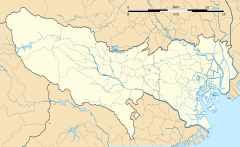| KO34 Keiō-hachiōji Station 京王八王子駅 | ||||||||||||||
|---|---|---|---|---|---|---|---|---|---|---|---|---|---|---|
 Keiō-hachiōji Station and Keiō-hachiōji Shopping Center "K-8" Keiō-hachiōji Station and Keiō-hachiōji Shopping Center "K-8" | ||||||||||||||
| General information | ||||||||||||||
| Location | 3-27-1 Myojin-cho, Hachiōji-shi, Tokyo 192-0046 Japan | |||||||||||||
| Coordinates | 35°39′28″N 139°20′35″E / 35.6578803°N 139.3431401°E / 35.6578803; 139.3431401 | |||||||||||||
| Operated by | ||||||||||||||
| Line(s) | ||||||||||||||
| Distance | 37.9 km from Shinjuku | |||||||||||||
| Platforms | 1 island platform | |||||||||||||
| Tracks | 2 | |||||||||||||
| Other information | ||||||||||||||
| Station code | KO34 | |||||||||||||
| Website | Official website | |||||||||||||
| History | ||||||||||||||
| Opened | 21 May 1988 | |||||||||||||
| Previous names | Higashi-Hachiōji Station (until 1963) | |||||||||||||
| Passengers | ||||||||||||||
| FY2019 | 58,124 | |||||||||||||
| Services | ||||||||||||||
| ||||||||||||||
| ||||||||||||||
Keiō-hachiōji Station (京王八王子駅, Keiō-hachiōji-eki) is a passenger railway station located in the city of Hachiōji, Tokyo, Japan, operated by the private railway operator Keio Corporation. It is a five-minute walk from JR East's Hachiōji Station.
Lines
Keiō-hachiōji Station is a terminus of the Keio Line, and is located 37.9 kilometers from the opposing terminus of the line at Shinjuku Station.
Station layout
| Keiō-hachiōji Station Track Diagram | |||||||||||||||||||||||||||||||||||||||||||||||||
|---|---|---|---|---|---|---|---|---|---|---|---|---|---|---|---|---|---|---|---|---|---|---|---|---|---|---|---|---|---|---|---|---|---|---|---|---|---|---|---|---|---|---|---|---|---|---|---|---|---|
| Legend | |||||||||||||||||||||||||||||||||||||||||||||||||
| |||||||||||||||||||||||||||||||||||||||||||||||||
This station consists of one underground dead-headed island platforms serving two tracks, with the station building located above.
Platforms
| 1, 2 | KO Keiō Line | for Kitano, Chōfu, Meidaimae, Sasazuka, and Shinjuku KO Keiō Takao Line for Takaosanguchi (via Kitano) KO Keiō Sagamihara Line for Hashimoto (via Chōfu) S Toei Shinjuku Line for Motoyawata (only one departure in morning peak hour) |
History
The station opened on 24 March 1925, originally named Higashi-Hachiōji Station (東八王子駅). The station was renamed on 11 December 1963 and moved 190 m closer to Tokyo. The station was rebuilt as an underground station on 2 April 1989.
From 22 February 2013, station numbering was introduced on Keio lines, with Keiō-hachiōji Station becoming "KO34".
Passenger statistics
In fiscal 2019, the station was used by an average of 58,124 passengers daily.
The passenger figures (boarding passengers only) for previous years are as shown below.
| Fiscal year | daily average |
|---|---|
| 2005 | 59,676 |
| 2010 | 58,366 |
| 2015 | 59,083 |
Surrounding area
- Hachiōji Station (JR East Chuo Main Line)
References
- Keio Railway Map
- ^ Terada, Hirokazu (19 January 2013). データブック日本の私鉄 [Databook: Japan's Private Railways]. Japan: Neko Publishing. p. 228. ISBN 978-4-7770-1336-4.
- 京王線・井の頭線全駅で「駅ナンバリング」を導入します。 [Station numbering to be introduced on Keio Line and Inokashira Line] (PDF). News release (in Japanese). Keio Corporation. 18 January 2013. Archived from the original (PDF) on 16 June 2019. Retrieved 28 June 2013.
- 1日の駅別乗降人員 [Station passenger figures (Fiscal 2019)] (in Japanese). Japan: Keio Railway Company. Retrieved 29 January 2021.
- 東京都統計年鑑 平成17年 9 運輸及び通信 [Tokyo Metropolitan Government statistics (fiscal 2005)] (in Japanese). Japan: Tokyo Metropolitan Government. Retrieved 26 March 2021.
- 東京都統計年鑑 平成22年 [Tokyo Metropolitan Government statistics (fiscal 2010)] (in Japanese). Japan: Tokyo Metropolitan Government. Retrieved 26 March 2021.
- 東京都統計年鑑 平成27年 9 運輸及び通信 [Tokyo Metropolitan Government statistics (fiscal 2010)] (in Japanese). Japan: Tokyo Metropolitan Government. Retrieved 26 March 2021.
External links
![]() Media related to Keio-Hachioji Station at Wikimedia Commons
Media related to Keio-Hachioji Station at Wikimedia Commons
- Keiō-hachiōji Station station information (in Japanese)
| Stations of the Keiō Line | |
|---|---|
Note: Stations in italics (Hatsudai and Hatagaya) are on the Keiō New Line. Keiō Line trains bypass these stations. |

